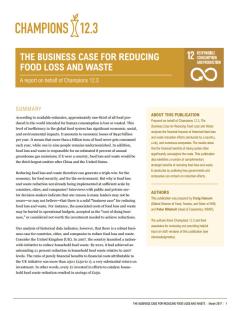
According to available estimates, approximately one-third of all food produced in the world intended for human consumption is lost or wasted. This level of inefficiency in the global food system has significant economic, social, and environmental impacts. It amounts to economic losses of $940 billion per year. It means that more than a billion tonnes of food never gets consumed each year, while one in nine people remains undernourished. In addition, food loss and waste are responsible for an estimated 8 percent of annual greenhouse gas emissions; if it were a country, food loss and waste would be the third-largest emitter after China and the United States.
Reducing food loss and waste, therefore, can generate a triple win: for the economy, for food security, and for the environment. But why are food loss and waste reduction not already being implemented at sufficient scale by countries, cities, and companies? Interviews with public and private sector decision-makers indicate that one reason is many leaders may not be aware—or may not believe—that there is a solid “business case” for reducing food loss and waste. For instance, the associated costs of food loss and waste may be buried in operational budgets, accepted as the “cost of doing business,” or considered not worth the investment needed to achieve reductions. This analysis of historical data indicates, however, that there is a robust business case for countries, cities, and companies to reduce food loss and waste.
